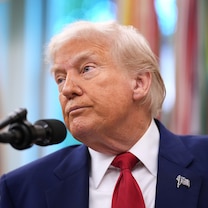'This Week' Transcript: EXCLUSIVE: Vice President Joe Biden
George Stephanopoulos goes behind the scenes with VP Joe Biden in Iraq.
July 5, 2009 — -- ABC'S "THIS WEEK WITH GEORGE STEPHANOPOULOS"
STEPHANOPOULOS: Major milestone this week here in Iraq with the American troops pulling out of the cities. And I wonder if you can put the broader American mission in context. Are we in the process of securing victory or cutting our losses to come home?
BIDEN: Securing victory. Look, the president and I laid out a plan in the campaign which was twofold. One, withdraw our troops from Iraq in a rational timetable consistent with what the Iraqis want. And the same time, leave behind a stable and secure country.
And one of the reasons I'm here, George, is to push the last end of that, which is the need for political settlement on some important issues between Arabs and Kurds and among the confessional groups. And I think we're well on our way.
STEPHANOPOULOS: You know, your predecessor doesn't seem convinced.
(LAUGHTER)
STEPHANOPOULOS: John Hannah, Vice President Cheney's national security adviser, wrote this week that under Obama, Bush's commitment to winning in Iraq has all been vanished. The vice president warned against a premature withdrawal.
He said: "I would not want to see the U.S. waste all of the tremendous sacrifice that has gotten us to this point."
BIDEN: You know, it's kind of ironic. It's their timetable we are implementing. Cheney and Bush agreed with the Iraqis before we were elected that we'd have combat troops out of the cities by June 30th.
STEPHANOPOULOS: So he's wrong to be worried?
BIDEN: Well, I mean, it's -- I mean, for this he can't have it both ways. He negotiated that timetable. We have met the commitment the timetable the last administration negotiated with Iraqis. And we're totally confident that is the right thing to do.
So I find it kind of ironic that he's criticizing his own agreement that he negotiated.
STEPHANOPOULOS: You're also facing a little bit of criticism from the Iraqis. You know yesterday you stood up there with Prime Minister Maliki and talked about your commitment to solve these political problems, yet his spokesman came out after the meeting and said: "This is purely an Iraqi issue, we don't want the Americans to get involved."
What do you say to that?
BIDEN: Well, that's that not what -- that's not what the prime minister said. The prime minister said that we may need you to get involved.
What we offered the prime minister, as well as the speaker, as well as the two vice presidents, was that to the extent -- let me give you an example. The United Nations has started a process to deal with what they called the "disputed internal borders." And that is the debate between the Kurds and the Arabs as to where the line is.
Kirkuk is probably the biggest flashpoint. And we were asked that we would -- would we be helpful to the United Nations in doing this? I was further asked that would I communicate to the Kurdish leadership, who I have a close relationship with, that their passing a constitution through their parliament in Kurdistan was not helpful to the process that was under way.
STEPHANOPOULOS: So what's going on here? Maliki says one thing and his spokesman says another.
BIDEN: Well, look, I think that it's very important that Prime Minister Maliki and all of the Iraqi leaders are able to in fact communicate, which is true, to the people of Iraq, that they're now a sovereign nation.
They take directions from no one. That they are able to handle their own internal affairs. And the fact -- my guess is, if the spokesman said that -- which surprises me, if the spokesman said that, I'd imagine they're worried about an upcoming election, making it look like the United States is going to continue to try to direct things here.
We are not. That is not why I'm here.
STEPHANOPOULOS: We're not going to direct things, but what if the Iraqi people -- they've been dealing with these political disputes for an awful long time, what if they can't solve them, the violence flares up again?
BIDEN: Well, that's going to be a tragic outcome for the Iraqi people. We made a commitment.
STEPHANOPOULOS: But are we going to put our lives on the line again?
BIDEN: No. We made a commitment to withdraw our troops from the cities by the 30th, to withdraw our combat brigades from Iraq by next summer -- the end of next summer, and withdraw all troops according to the SOFA, that agreement we negotiated with them, by the end of 2011. That is our intention.
STEPHANOPOULOS: But no matter what, 2011, American troops all gone?
BIDEN: That is the intention. We believe the Iraqis will be fully capable of maintaining their own security. And we believe that with the time frame, with their upcoming election -- you know they're having an election in January, I know you know that, they'll form a new government early -- in late winter as a consequence of that election.
And it is our expectation that that election will come off peacefully and that their democracy is gradually maturing, so.
STEPHANOPOULOS: Let me turn to Iran. We're three weeks out from their election.
BIDEN: Yes.
STEPHANOPOULOS: Do you have any doubt it was stolen?
BIDEN: Well, look, what I don't want to do is play into the hands of the supreme leader and Ahmadinejad like they're blaming the British now. You know, there -- that the reason why there was unrest is outside influence.
STEPHANOPOULOS: They're saying they have confessions from reformers saying that.
BIDEN: Well, you know, they say a lot of things. That's simply not true. The -- I think the dust hasn't settled yet in terms of?
STEPHANOPOULOS: Still, three weeks ago.
BIDEN: Well, no, now here's what I think. I mean, I think it's clear that the consequences of the way the election was conducted and the way that the election was declared -- who was declared the winner and how, is going to have a rippling effect.
What that effect will be, I don't know. I think we have to wait to see how this settles out and -- before we can make a judgment.
STEPHANOPOULOS: But there's no doubt now that they responded violently to the election.
BIDEN: Oh, there is no doubt about that. There is none. The whole world saw it. And it is -- we have to acknowledge as a free and sovereign nation that we abhor the violence that took place. We think it was inappropriate, the way in which they treated those protesters.





